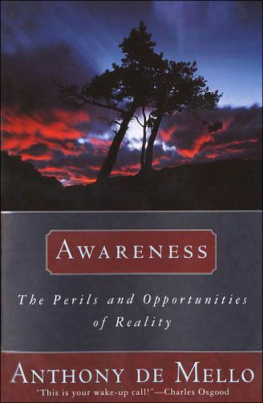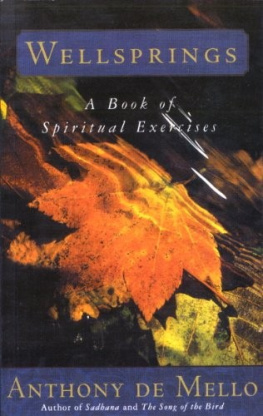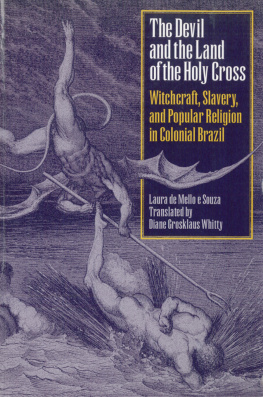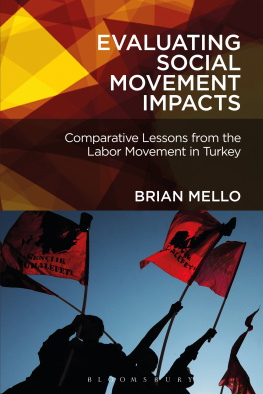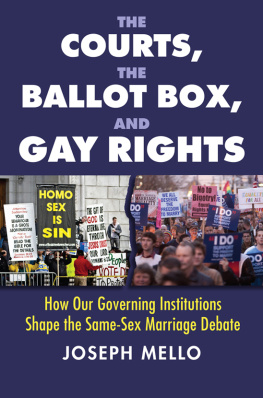Anthony De Mello - Contact with God
Here you can read online Anthony De Mello - Contact with God full text of the book (entire story) in english for free. Download pdf and epub, get meaning, cover and reviews about this ebook. year: 2009, publisher: The Crown Publishing Group, genre: Religion. Description of the work, (preface) as well as reviews are available. Best literature library LitArk.com created for fans of good reading and offers a wide selection of genres:
Romance novel
Science fiction
Adventure
Detective
Science
History
Home and family
Prose
Art
Politics
Computer
Non-fiction
Religion
Business
Children
Humor
Choose a favorite category and find really read worthwhile books. Enjoy immersion in the world of imagination, feel the emotions of the characters or learn something new for yourself, make an fascinating discovery.
- Book:Contact with God
- Author:
- Publisher:The Crown Publishing Group
- Genre:
- Year:2009
- Rating:3 / 5
- Favourites:Add to favourites
- Your mark:
- 60
- 1
- 2
- 3
- 4
- 5
Contact with God: summary, description and annotation
We offer to read an annotation, description, summary or preface (depends on what the author of the book "Contact with God" wrote himself). If you haven't found the necessary information about the book — write in the comments, we will try to find it.
Contact with God — read online for free the complete book (whole text) full work
Below is the text of the book, divided by pages. System saving the place of the last page read, allows you to conveniently read the book "Contact with God" online for free, without having to search again every time where you left off. Put a bookmark, and you can go to the page where you finished reading at any time.
Font size:
Interval:
Bookmark:


Awareness
The Heart of the Enlightened
One Minute Wisdom
Sadhana
The Song of the Bird
Taking Flight
The Way to Love
Wellsprings
Walking on Water

 Contents
Contents Preface to the
Preface to theAmerican Edition
Contact with God was published posthumously by Gujarit Sahitya Prakash, a Jesuit press in India. In undertaking an American edition, the editors had a dilemma of sorts; for example, whether to generalize and formalize the text, or to leave it more or less as delivered orally to a maleand Indian Jesuitreligious audience. In deference to Father de Mello, it appeared the better course was to follow the original text where it served, leaving the reader to adjust to his spoken style and to accept a number of informalities. His paraphrasing of Scripture and some absence of attribution where texts are quoted are examples. It being a posthumous publication, the usual recourse of querying the author was, naturally, not possible. Outside of quotations American spellings are used, and inclusive language was employed where the text permitted it.
Joseph F. Downey, S.J.
Editor ial Director
Loyola University Press
 Foreword
ForewordThose who were familiar with Tony de Mello in his lifetime know and still remember that his ministry went through several distinct stages, corresponding partly to the needs of the people he served but also to the demands of an inner development. Externally, one could perceive successively the spiritual director, the therapist, the guru; internally, a close friend has spoken of the progression of values from holiness through love to freedom.
Obviously, these values are not mutually exclusive; nor were the stages compartmentalized. There was not only continuity but a certain unity in the various roles he assumed. In fact, one might say that he was first and last a spiritual director in the great Christian tradition. Further, it could be argued that the ultimate reason why he remained popular to the end, when some had misgivings about the way he was going, was that he never outlived his beginnings and always came across as an incomparable guide to closer contact with God.
And so we come to this posthumous publication: a transcript of his retreat conferences, which he himself carefully edited but never released. There is no answer to why he did not make them available; or to what he would think of the present venture. The incontestable fact is that many people of all sorts will be very happy to have these notes.
The text is reproduced just as Tony left it; only a title has been provided, and some slips were correctedthough there was a suggestion favoringrevision. The style is somewhat old-fashioned, the content not altogether post-conciliar, the language quite sexist. This last flaw, regarded as unpardonable today, could be excused because he was originally addressing Jesuits. But there is hardly any reference to the Ignatian Spiritual Exercises, which were presumably dealt with in private interviews. The subject of the talks can be summed up in the classical Three Fundamental Principles: prayer, penance and the love of Christ. The style is typical of Tony: forceful.
That is how he always was; he did not impose himself but irresistibly invited us to share in his experience. In the final phase before his death, it was not clear what he experienced; and his attempts at articulation were not too convincing. But he was always the same Tony. So this book is a sort of homecoming; and it is appropriately timed for the Ignatian Jubilee, which commemorates the birth of Ignatius of Loyola in 1491, and calls on Jesuits and their friends all over the world to enter more deeply into the spiritual legacy of the saint.
For this occasion, Tony de Mello and his retreat conferences have a message, and we find it expressed in a homily he delivered much later, on July 31, 1983:
We need to sink deep roots into God if we are going to be attuned to the creating Spirit within, if we are going to have the power to love and to be loyal to this Church which will at times oppose and misunderstand us. Only contemplatives can do this. Only they will know how to combine loyalty and obedience with creativity and confrontation. I pray at this Mass that God and history will not find us wanting. I pray that Saint Ignatius will have cause to be proud of us.
Parmananda R. Divarkar, S.J.
Bombay
June 1990
We have tried to remedy the problem of noninclusive language in the American edition, see page viied.

I wish to situate this retreat in the context of the Church and the world today. We have assembled here for a period of silence and prayer and withdrawal at a time when the Church is in crisis and the world in desperate need of peace and development and justice. May we not be rightly accused of escapism? Can we afford the luxury of an eight-day withdrawal when the house is on fire and every available hand is needed to put the fire out?
Are We Escapists?I want to continue with that comparison. The house is indeed on fire. But too many of us, tragically, have no motivation to put it out; we would rather busy ourselves with our little worlds and little lives. Too many of us are too blind even to notice the firewe notice only what suits us. And even supposing we are gifted with motivation and proper sight, how many of us lack the strength to work perseveringly on this fire; how many of us lack the wisdom and reflection to find the best and quickest means for putting the fire out? And then there is so much selfishness in the way we set about the taska selfishness that makes us come in one another's way even when we have good intentions.
The retreat, on the face of it, does seem like a luxury and an escape. But it is the kind of luxury taken by a general who withdraws from the direct line of firing to give himself time to reflect and to come up with a more effective plan of battle. It is the kind of escape that will enable us to strengthen our motivation, to widen our hearts, to sharpen our sight, to energize ourselves to plunge more wholeheartedly into the tasks that God has assigned for us in the world. Dag Hammarskjld, the mystic who became U.N. Secretary General, was so right when he said in his diary, In our era the path to holiness necessarily passes through the world of action. We contemplate and pray to re-create ourselves and to act more energetically and more effectively for God's glory and the benefit of the world.
The Greatest Need of the ChurchThe Church is passing through a period of chaos and crisis. This is not necessarily a bad thing. A crisis is a challenge to grow. Chaos precedes creationprovided, and this is a big proviso, the Spirit of God is hovering over it.
The greatest need of the Church today is not new legislation, new theology, new structures, new liturgiesall these without the Holy Spirit are like a dead body without a soul. We desperately need someone to take away our hearts of stone and give us a heart of flesh; we need a fresh infusion of enthusiasm and inspiration and courage and spiritual strength. We need to persevere in our task without discouragement or cynicism, with new faith in the future and in the people we work for. In other words, we need a fresh outpouring of the Holy Spirit.
Font size:
Interval:
Bookmark:
Similar books «Contact with God»
Look at similar books to Contact with God. We have selected literature similar in name and meaning in the hope of providing readers with more options to find new, interesting, not yet read works.
Discussion, reviews of the book Contact with God and just readers' own opinions. Leave your comments, write what you think about the work, its meaning or the main characters. Specify what exactly you liked and what you didn't like, and why you think so.


